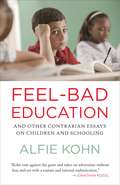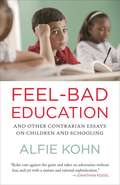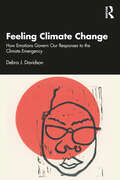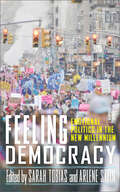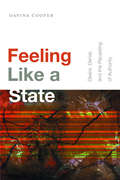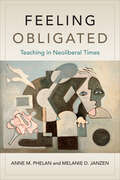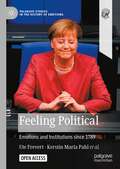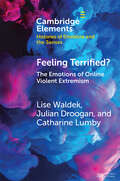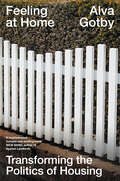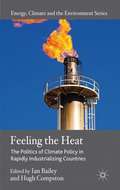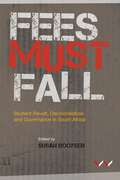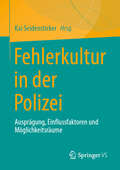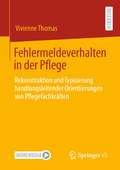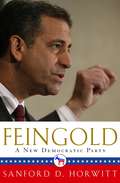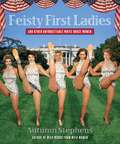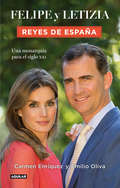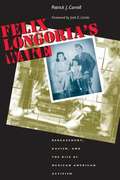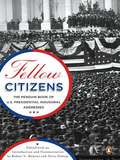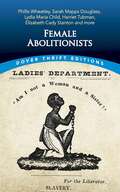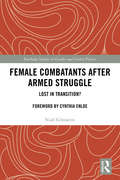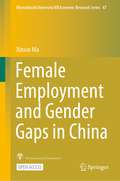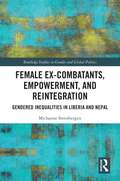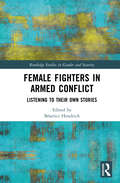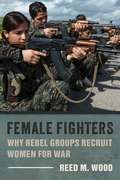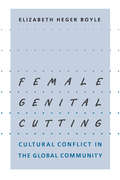- Table View
- List View
Feel-Bad Education
by Alfie KohnMind-opening writing on what kids need from school, from one of education's most outspoken voices Almost no writer on schools asks us to question our fundamental assumptions about education and motivation as boldly as Alfie Kohn. The Washington Post says that "teachers and parents who encounter Kohn and his thoughts come away transfixed, ready to change their schools." And Time magazine has called him "perhaps the country's most outspoken critic of education's fixation on grades [and] test scores." Here is challenging and entertaining writing on where we should go in American education, in Alfie Kohn's unmistakable voice. He argues in the title essay with those who think that high standards mean joylessness in the classroom. He reflects thoughtfully on the question "Why Self-Discipline Is Overrated." And in an essay for the New York Times, which generated enormous response, he warns against the dangers of both punishing and praising children for what they do instead of parenting "unconditionally." Whether he's talking about school policy or the psychology of motivation, Kohn gives us wonderfully provocative--and utterly serious--food for thought. This new book will be greeted with enthusiasm by his many readers, and by teachers and parents seeking a refreshing perspective on today's debates about kids and schools.
Feel-Bad Education: Contrarian Essays on Children and Schooling
by Alfie KohnMind-opening writing on what kids need from school, from one of education's most outspoken voices. Arguing that our schools are currently in the grip of a "cult of rigor"--a confusion of harder with better that threatens to banish both joy and meaningful intellectual inquiry from our classrooms--Alfie Kohn issues a stirring call to rethink our priorities and reconsider our practices. Kohn's latest wide-ranging collection of writings will add to his reputation as one of the most incisive thinkers in the field, who questions the assumptions too often taken for granted in discussions about education and human behavior. In nineteen recently published essays--and in a substantive introduction, new for this volume--Kohn repeatedly invites us to think more deeply about the conventional wisdom. Is self-discipline always desirable? he asks, citing surprising evidence to the contrary. Does academic cheating necessarily indicate a moral failing? Might inspirational posters commonly found on school walls (Reach for the stars!) reflect disturbing assumptions about children? Could the use of rubrics for evaluating student learning prove counterproductive? Subjecting young children to homework, grades, or standardized tests--merely because these things will be required of them later--reminds Kohn of Monty Python's "getting hit on the head lessons." And, with tongue firmly in cheek, he declares that we should immediately begin teaching twenty-second-century skills. Whether Kohn is clearing up misconceptions about progressive education or explaining why incentives for healthier living are bound to backfire, debunking the idea that education reform should be driven by concerns about economic competitiveness or putting "Supernanny" in her place, his readers will understand why the Washington Post has said that "teachers and parents who encounter Kohn and his thoughts come away transfixed, ready to change their schools."
Feeling Climate Change: How Emotions Govern Our Responses to the Climate Emergency
by Debra J. DavidsonExamining the social response to the mounting impacts of climate change, Feeling Climate Change illuminates what the pathways from emotions to social change look like—and how they work—so we can recognize and inform our collective attempts to avert further climate catastrophe.Debra J. Davidson engages with how our actions are governed by a complex of rules, norms, and predispositions, central among which operates our emotionality, to assess individual and collective responses to the climate crisis, applying a critical and constructive analysis of human social prospects for confronting the climate emergency in manners that minimize the damage and perhaps even enhance the prospects for meaningful collective living.Providing a crucial understanding of our emotionality and its role in individual behaviour, collective action, and ultimately in social change, this book offers researchers, policymakers, and citizens essential insights into our personal and collective responses to the climate emergency.
Feeling Democracy: Emotional Politics in the New Millennium (The Feminist Bookshelf: Ideas for the 21st Century)
by Sarah Tobias Arlene Stein Nermin Allam Kathryn Abrams Noëlle McAfee Ciara Torres-Spelliscy Kirin Gupta Ileana NachescuCultural critic Lauren Berlant wrote that “politics is always emotional,” and her words hold especially true for politics in the twenty-first century. From Obama to Trump, from Black Lives Matter to the anti-abortion movement, politicians and activists appeal to hope, fear, anger, and pity, all amplified by social media. The essays in Feeling Democracy examine how both reactionary and progressive politics are driven largely by emotional appeals to the public. The contributors in this collection cover everything from immigrants’ rights movements to white nationalist rallies to show how solidarities forged around gender, race, and sexuality become catalysts for a passionate democratic politics. Some essays draw parallels between today’s activist strategies and the use of emotion in women-led radical movements from the 1960s and 1970s, while others expand the geographic scope of the collection by considering Asian decolonial politics and Egyptian pro-democracy protests. Incorporating scholarship from fields as varied as law, political science, philosophy, psychoanalysis, and history, Feeling Democracy considers how emotional rhetoric in politics can be a double-edged sword—often wielded by authoritarian populists who seek to undermine democracy but sometimes helping to bring about a genuine renewal of participatory democracy.
Feeling Like a State: Desire, Denial, and the Recasting of Authority (Global and Insurgent Legalities)
by Davina CooperA transformative progressive politics requires the state's reimagining. But how should the state be reimagined, and what can invigorate this process? In Feeling Like a State, Davina Cooper explores the unexpected contribution a legal drama of withdrawal might make to conceptualizing a more socially just, participative state. In recent years, as gay rights have expanded, some conservative Christians—from charities to guesthouse owners and county clerks—have denied people inclusion, goods, and services because of their sexuality. In turn, liberal public bodies have withdrawn contracts, subsidies, and career progression from withholding conservative Christians. Cooper takes up the discourses and practices expressed in this legal conflict to animate and support an account of the state as heterogeneous, plural, and erotic. Arguing for the urgent need to put new imaginative forms into practice, Cooper examines how dissident and experimental institutional thinking materialize as people assert a democratic readiness to recraft the state.
Feeling Obligated: Teaching in Neoliberal Times
by Anne M. Phelan Melanie D. JanzenFeeling Obligated combines theoretical insights with the first-hand experiences of Canadian teachers to illustrate the impact of neoliberalism – the installation of market norms into educational and social policies – on teachers’ professional integrity. Anne M. Phelan and Melanie D. Janzen illustrate the miserable conditions in which teachers teach, their efforts to navigate and withstand those circumstances, and their struggle to respond ethically to students, especially those already marginalized economically and socially. Exploring how educational policies attempt to recast teachers as skilled clinicians, the book revitalizes a conversation about teaching as a vocation wherein the challenge of obligation is of central concern. Haunted by what has already happened and threatened by what may yet occur, Feeling Obligated foregrounds the challenge of ethical obligation in teaching and makes a strong case for the revitalization of teaching as a vocation, involving commitment, resolve, and trust in a future yet to come.
Feeling Political: Emotions and Institutions since 1789 (Palgrave Studies in the History of Emotions)
by Ute Frevert Michael Amico Francesco Buscemi Caroline Moine Philipp Nielsen Hannah Malone Juliane Brauer Kerstin Maria Pahl Agnes Arndt Karsten Lichau Julia WambachHistoricizing both emotions and politics, this open access book argues that the historical work of emotion is most clearly understood in terms of the dynamics of institutionalization. This is shown in twelve case studies that focus on decisive moments in European and US history from 1800 until today. Each case study clarifies how emotions were central to people’s political engagement and its effects. The sources range from parliamentary buildings and social movements, to images and speeches of presidents, from fascist cemeteries to the International Criminal Court. Both the timeframe and the geographical focus have been chosen to highlight the increasingly participatory character of nineteenth- and twentieth-century politics, which is inconceivable without the work of emotions.
Feeling Terrified?: The Emotions of Online Violent Extremism (Elements in Histories of Emotions and the Senses)
by Julian Droogan Lise Waldek Catharine LumbyThis Element presents original research into how young people interact with violent extremist material, including terrorist propaganda, when online. It explores a series of emotional and behavioural responses that challenge assumptions that terror or trauma are the primary emotional responses to these online environments. It situates young people's emotional responses within a social framework, revealing them to have a relatively sophisticated relationship with violent extremism on social media that challenges simplistic concerns about processes of radicalisation. The Element draws on four years of research, including quantitative surveys and qualitative focus groups with young people, and presents a unique perspective drawn from young people's experiences.
Feeling at Home: Transforming the Politics of Housing
by Alva GotbyOur feelings about housing are political, and a grasp of them is essential to solving the housing crisis – from the author of They Call It LoveHousing is more than bricks and mortar. The home is where our hopes and dreams play out, and it lies at the heart of our lives. This is where we rest, eat, and relax. The home we enjoy can determine our health, life expectancy, and day-to-day well-being. In contrast, the lack of a stable residence can lead to mental and physical illness and often premature death. This is central to how we conceive of a good and dignified life.Feeling at Home grapples with the practical and emotional questions of housing – domestic labour, privacy, security, ownership, and health. Is it possible to imagine success without home ownership? Alva Gotby makes clear that solving the housing crisis is about much more than housing stock. It is about revolutionising our everyday lives and labours.
Feeling the Heat
by Ian Bailey Hugh CompstonTo avoid uncontrolled climate change, greenhouse gas emissions will have to be brought under control by major emitters outside the affluent West. The authors investigate the political obstacles in BRIC countries and what their governments could do to strengthen climate policies without incurring serious political damage.
Fees Must Fall: Student revolt, decolonisation and governance in South Africa
by Susan BooysenThis book explores the student discontent a year after the start of the 2015 South African #FeesMustFall revolt#FeesMustFall, the student revolt that began in October 2015, was an uprising against lack of access to, and financial exclusion from, higher education in South Africa. More broadly, it radically questioned the socio-political dispensation resulting from the 1994 social pact between big business, the ruling elite and the liberation movement. The 2015 revolt links to national and international youth struggles of the recent past and is informed by black consciousness politics and social movements of the international left. Yet, its objectives are more complex than those of earlier struggles. The student movement has challenged the hierarchical, top-down leadership system of university management and it’s ‘double speak’ of professing to act in workers’ and students’ interests yet entrenching a regressive system for control and governance. University managements, while on one level amenable to change, have also co-opted students into their ranks to create co-responsibility for the highly bureaucratised university financial aid that stands in the way of their social revolution. This book maps the contours of student discontent a year after the start of the #FeesMustFall revolt. Student voices dissect colonialism, improper compromises by the founders of democratic South Africa, feminism, worker rights and meaningful education. In-depth assessments by prominent scholars reflect on the complexities of student activism, its impact on national and university governance, and offer provocative analyses of the power of the revolt.
Fehlerkultur in der Polizei: Ausprägung, Einflussfaktoren und Möglichkeitsräume
by Kai SeidenstickerEin Großteil der polizeilichen Praxis findet sichtbar im öffentlichen Raum statt und ist von unterschiedlichen, teilweise nur in Ansätzen beeinflussbaren Dynamiken betroffen. Daher sollte es nicht verwundern, dass dabei auch Fehler auftreten und bekannt werden. Der Umgang mit Fehlern, also die Art wie Fehler betrachtet und bearbeitet werden, kann allerdings sehr unterschiedlich ausgeprägt sein. Die Beiträge dieses Sammelbands untersuchen dieses Thema aus unterschiedlichen Blickwinkeln systematisch.
Fehlermeldeverhalten in der Pflege: Rekonstruktion und Typisierung handlungsleitender Orientierungen von Pflegefachkräften
by Vivienne ThomasIn dem vorliegenden Werk geht es um die Bereitschaft von Pflegefachpersonen, Fehler zu melden. Aus einer professions- und fehlertheoretischen Perspektive wird die Frage untersucht, inwiefern die Entscheidung zur Fehlermeldung Teil des professionellen Selbstverständnisses von Pflegefachkräften ist und durch welche Erfahrungen es geprägt wird. Es wird deutlich, dass die Entscheidung, ob ein Fehler gemeldet wird oder nicht, abhängig ist von den Orientierungen zur Fehlerkultur, dem professionellen Selbstverständnis der Pflegefachkraft sowie den erlebten Erfahrungen. Dabei konnten drei Typen identifiziert werden, welche die primären, handlungsleitenden Orientierungen der Pflegefachkräfte widerspiegeln.
Feingold: A New Democratic Party
by Sanford D. HorwittRuss Feingold is a rarity in American politics. A staunch civil libertarian, he was the only member of the U.S. Senate who voted against the ill-conceived USA Patriot Act that was rushed through Congress in the wake of the September 11 terrorist attacks. In 2002, while the Bush administration's fabrications and scare tactics persuaded an overwhelming majority of the Senate to vote for the Iraq war resolution, Feingold opposed it. Washington insiders thought such controversial votes could doom Feingold's 2004 reelection. But he won by a near landslide, far outdistancing his party's presidential candidate, John Kerry. Sanford D. Horwitt writes in this timely, compelling independent biography that Russ Feingold "represents the progressive side of the Democratic divide more clearly and authentically than any successful politician on the national stage." The third-term senator's willingness to take bold stands -- he was the first in the Senate to call for a timetable for redeploying U.S. troops from Iraq -- has inspired a growing number of rank-and-file Democrats across the country. Drawing on scores of interviews and historical documents, Horwitt shows that Feingold's authenticity is deeply rooted in the old progressive tradition personified by one of his heroes, Robert M. La Follette, the legendary Wisconsin governor and U.S. senator. "Fighting Bob" and the other great reformers of the Progressive Era placed a high value on honest, efficient government, investment in public education, health and infrastructure, and curbs on corporate power and other wealthy interests in the political process. Feingold became known to a national audience when he teamed up with Republican John McCain on campaign finance reform legislation. After a seven-year battle, the McCain-Feingold bill became the first major reform of the campaign laws since the Watergate era. Feingold, who grew up in a small southeastern Wisconsin town, is a man of modest means and the grandson of Jewish immigrants. In this lively portrait, Horwitt evokes mid-century Janesville, a Republican stronghold on the banks of the Rock River, where a precocious Rusty Feingold absorbed lifelong lessons about the importance of community and personal integrity. Beginning with his first election to public office, he has defied conventional political wisdom and long odds, Horwitt tells us, a pattern that has been repeated throughout his career. Feingold has shown how a new, reinvigorated Democratic Party can stand for progressive ideals, resist the corrupting influence of special interests and win elections.
Feisty First Ladies and Other Unforgettable White House Women
by Autumn StephensFirst ladies are supposed to be dignified background figures, quietly supportive of their husbands' agendas. Above all, they're not supposed to act out or cause even a whiff of scandal. Of course, reality often overrides conventional wisdom, and this book shows how far from the prim ideal many of the Presidents' wives have strayed. Part irreverent portrait gallery, part exuberant expose, Feisty First Ladies and Other Unforgettable White House Women introduces a remarkable array of wild women, from Martha Washington, who opposed her own husband's presidential election; to Abraham Lincoln's eccentric wife, Mary; to rebellious daughters like Patti Davis who were the tabloid fodder of their day. Laugh-out-loud funny and filled with amazing stranger-than-fiction facts from our American history, Feisty First Ladies journeys into the realm of the eclectic sisterhood whose outrageous words and deeds have rocked the fusty old foundations of the White House -- and the nation!
Felipe y Letizia. Reyes de España: Una monarquía para el siglo XXI
by Emilio Oliva Carmen Enríquez<P>Así son los nuevos monarcas. Su historia de amor. Su cara y su cruz. Una obra amena e imprescindible para conocer más a fondo a don Felipe y a doña Letizia, una pareja real preparada desde hace años para reinar. Dicen quienes lo conocen más de cerca que Felipe VI gana en las distancias cortas. De naturaleza curiosa, serio y fiel a sus convicciones -defendió desde joven su intención de casarse solo por amor-, el nuevo rey de España es un demócrata convencido, amante de la Constitución; un rey para el siglo XXI. <P>Su esposa, Letizia Ortiz Rocasolano, suscita un gran interés en los medios de comunicación nacionales y extranjeros y cualquiera de sus apariciones públicas genera comentarios, críticos o elogiosos, sobre su vestuario, sus aciertos o errores de protocolo, sus operaciones de estética o sobre la no muy buena relación que mantiene con su familia política. <P>Los periodistas Carmen Enríquez y Emilio Oliva nos ofrecen en Felipe y Letizia. Reyes de España un retrato a fondo de los nuevos reyes -su personalidad, sus costumbres, su imagen, su forma de abordar el trabajo, la educación de sus hijas o su compromiso con España- construido sobre los testimonios de muchas de las personas que los han acompañado en su doble faceta de príncipes y ciudadanos. <P>Y aportan datos concretos sobre el valor de la monarquía como forma de Estado justo cuando en el Palacio de la Zarzuela se acaba de producir el relevo en la institución de la Corona.
Felix Longoria's Wake
by Patrick J. CarrollDrawing on extensive documentary evidence and interviews with many key figures, including Dr. García and Mrs. Longoria, Carroll convincingly explains why the Longoria incident, though less severe than other acts of discrimination against Mexican Americans, ignited the activism of a whole range of interest groups from Argentina to Minneapolis. By putting Longoria's wake in a national and international context, he also clarifies why it became such a flash point for conflicting understandings of bereavement, nationalism, reason, and emotion between two powerful cultures—Mexicanidad and Americanism.
Fellow Citizens
by Terry Golway Robert V. ReminiThe complete American presidential inaugural addresses featuring historical background by a National Book Award winner A testament to the power of oratory, this stirring and often surprising collection includes all fifty-five United States presidential inaugural addresses, as well as a general introduction and commentary that provides historical context for each speech. Marking pivotal moments in American history, readers will learn: ? How George Washington came to ad-lib ?So help me, God? at the end of his first inaugural address ? Why Thomas Jefferson?s first inaugural address is considered one of the finest ever delivered ? The historical background behind Franklin D. Roosevelt?s ?The only thing we have to fear is fear itself? and John F. Kennedy?s ?Ask not what your country can do for you, ask what you can do for your country.?
Female Abolitionists (Dover Thrift Editions)
by Heidi GagnonA Dover Original, this collection of essays, letters, poems, and speeches by the bold women who joined the abolitionist movement of the nineteenth century will educate and inspire all who are interested in this era of American history. The collection includes the work of 26 remarkable women whose efforts, at great risk to their own safety, became instrumental in fighting slavery, including Phillis Wheatley, Sojourner Truth, Mary Prince, Sarah Mapps Douglass, Elizabeth Cady Stanton, Lydia Maria Child, Harriet Tubman, Angelina and Sarah Grimké, and more.
Female Combatants after Armed Struggle: Lost in Transition? (Routledge Studies in Gender and Global Politics)
by Niall GilmartinThis book stems from a simple ‘feminist curiosity’ that can be succinctly summed up into a single question: what happens to combatant women after the war? Based on in-depth interviews with 40 research participants, mostly former combatants within the Irish Republican Army (IRA), this book offers a critical exploration of republican women and conflict transition in the North of Ireland. Drawing on the feminist theory of a continuum of violence, this book finds that the dichotomous separation of war and peace within conventional approaches represents a gendered fiction. Despite undertaking wartime roles that were empowering, agentic, and subversive, this book finds that the ‘post-conflict moment’ as experienced by female combatants represents not peace and security, but a continuity of gender discrimination, violence, injustice, and insecurity. The experiences and perspectives contained in this book challenge the discursive deployment of terms such as post-conflict, peace, and security, and moreover, shed light on the many forms of post-war activism undertaken by combatant women in pursuit of peace, equality, and security. The book represents an important intervention in the field of gender, political violence, and peace, and more specifically, female combatants and conflict transition. It is analytically significant in its exploration of the ways in which gender operates within non-state military movements emerging from conflict, and will be of interest to students and scholars alike.
Female Employment and Gender Gaps in China (Hitotsubashi University IER Economic Research Series #48)
by Xinxin MaThis open access book investigates female employment and the gender gap in the labor market and households during China’s economic transition period. It provides the reader with academic evidence for understanding the mechanism of female labor force participation, the determinants of the gender gap in the labor market, and the impact of policy transformation on women’s wages and employment in China from an economics perspective. The main content of this book includes three parts―women’s family responsibilities and women’s labor supply (child care, parent care, and women’s employment), the gender gap in the labor market and society (gender gaps in wages, Communist Party membership, and participation in social activity), and the impacts of policy transformation on women’s wages and employment (the social security system and the educational expansion policy on women’s wages and employment) in China. This book provides academic evidence about these issues based on economics theories and econometric analysis methods using many kinds of long-term Chinese national survey data. This book is highly recommended to readers who are interested in up-to-date and in-depth empirical studies of the gender gap and women’s employment in China during the economic transition period. This book is of interest to various groups such as readers who are interested in the Chinese economy, policymakers, and scholars with econometric analysis backgrounds.
Female Ex-Combatants, Empowerment, and Reintegration: Gendered Inequalities in Liberia and Nepal (Routledge Studies in Gender and Global Politics)
by Michanne SteenbergenFemale Ex-Combatants, Empowerment, and Reintegration investigates the role of United Nations-led Disarmament, Demobilization, and Reintegration (DDR) programs in undermining female ex-combatants’ empowerment. The participation of female combatants in conflict has increasingly been recognized in feminist literatures and in policies and programs concerned with reintegrating ex-combatants and building peace. This has illustrated that female ex-combatants often experience "empowerment" through their role as combatant; however, this empowerment is often lost upon reintegration. UN-led DDR plays an important role in the broader peacebuilding process, as it is one of the largest interventions and directly aims to reintegrate ex-combatants into civilian life. This book draws on extensive field research and interviews with female ex-combatants and DDR officials in Liberia and Nepal to develop a nuanced and comprehensive picture of female ex-combatants’ empowerment and how this is undermined by DDR. Through reconceptualized frameworks of empowerment and an emancipatory peace, the book explores the pivotal role that DDR programs play in undermining female ex-combatants’ empowerment. The author argues that this is detrimental to peacebuilding, because DDR officials and documentation narrate female ex-combatants in limited and gendered ways, which reproduces gendered inequalities and define how female ex-combatants should behave. This book will be of great interest to scholars and practitioners working on gender, conflict, peace, security, and development.
Female Fighters in Armed Conflict: Listening to Their Own Stories (Routledge Studies in Gender and Security)
by Béatrice HendrichThis book explores the why and the how of women’s participation in armed struggle, and challenges preconceived assertions about women and violence, providing both a historic and a contemporary focus. The volume is about women who have participated in armed conflict as members of an armed group, trained in military action, with different tasks within the conflict. The chapters endeavor to make women’s own voices heard, to discover the untold stories of women as perpetrators and facilitators of military violence, and the authors do this through the use of personal interviews and the study of primary documents. The work widens the geographical perspective of feminist security studies to discover in what ways the historical, political, and social context has motivated the women to participate in military action, and presents new case study data from Germany, Ukraine, Turkey, Israel, Palestine, Cameroon, India, the Philippines, Vietnam and Latin America. Temporally, the chapters cover almost two centuries, from the late 19th century to the present day, touching upon a wide variety of examples of armed conflict, from wars of independence to the Second World War. Bringing together approaches from politics, history, anthropology and area studies, the chapters are informed by the fundamental insights of feminist research and address such pivotal questions as hegemonic masculinity in the armed forces and the relation between women’s armed violence and female agency. This book will be of much interest to students and researchers in gender and security studies, armed conflict and history.
Female Fighters: Why Rebel Groups Recruit Women for War
by Reed M. WoodThe presence of women combatants on the battlefield—especially in large numbers—strikes many observers as a notable departure from the historical norm. Yet women have played a significant active role in many contemporary armed rebellions. Over recent decades, numerous resistance movements in many regions of the globe have deployed thousands of female fighters in combat.In Female Fighters, Reed M. Wood explains why some rebel groups deploy women in combat while others exclude women from their ranks, and the strategic implications of this decision. Examining a vast original dataset on female fighters in over 250 rebel organizations, Wood argues rebel groups can gain considerable strategic advantages by including women fighters. Drawing on women increases the pool of available recruits and helps ameliorate resource constraints. Furthermore, the visible presence of female fighters often becomes an important propaganda tool for domestic and international audiences. Images of women combatants help raise a group’s visibility, boost local recruitment, and aid the group’s efforts to solicit support from transnational actors and diaspora communities. However, Wood finds that, regardless of the wartime resource challenges they face, religious fundamentalist rebels consistently resist utilizing female fighters. A rich, data-driven study, Female Fighters presents a systematic, comprehensive analysis of the impact women’s participation has on organized political violence in the modern era.
Female Genital Cutting: Cultural Conflict in the Global Community
by Elizabeth Heger BoyleThe practice of female genital cutting, sometimes referred to as female circumcision and common in a number of African states, has attracted increasing attention in recent years and mobilized strong international opposition. While it typically produces a visceral response of horror and revulsion in Westerners, the practice is widely regarded in some cultures as essential for proper development into womanhood and is defended by women who have themselves experienced it and who have had the procedure performed on their own daughters. It is also perceived in many Islamic communities as religiously prescribed, although most Islamic clerics do not condone the practice.In this study, sociologist Elizabeth Boyle examines this controversial issue from the perspectives of the international system, governments, and individuals. Drawing on previous scholarship, records of international organizations, demographic surveys, and the popular media, Boyle examines how the issue is perceived and acted upon at international, national, and individual levels. Grounding her work in the sociological theory of neoinstitutionalism, Boyle describes how the choices made by governments and individual women are influenced by the often conflicting principles of individual human rights and sovereign autonomy. She concludes that while globalization may exacerbate such conflicts, it can ultimately lead to social change.
